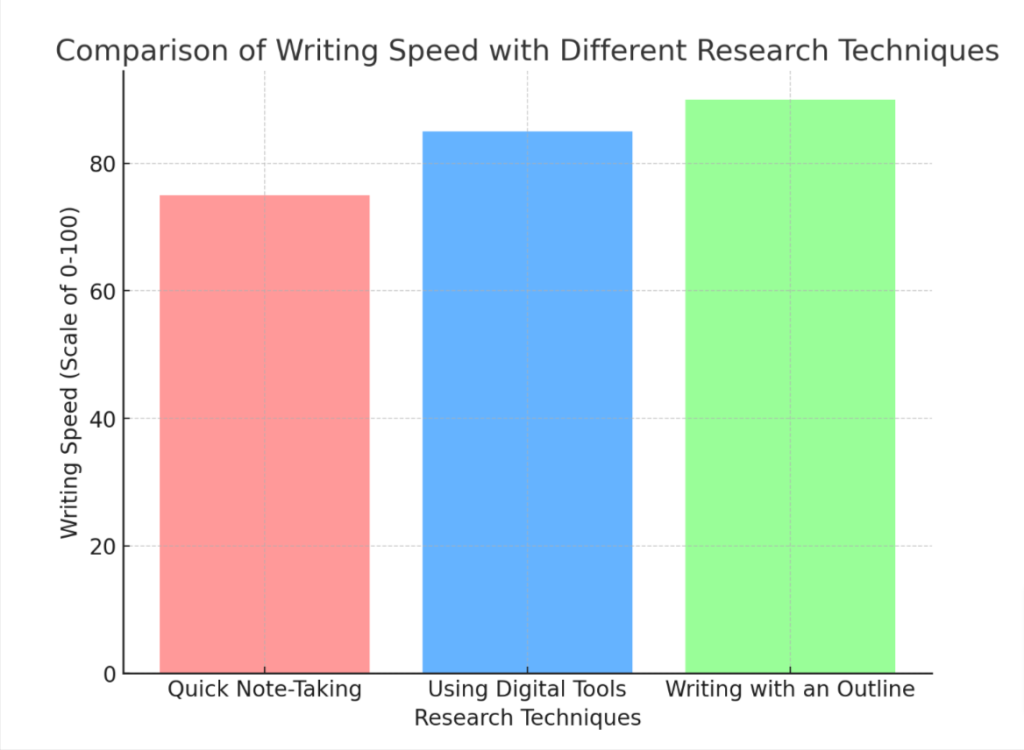Quick Research Tips For Faster Writing
Is writing a research paper leaving you frustrated and overwhelmed? With over 56% of students struggling with this process, you’re not alone. This blog post offers handy tips on conducting research quickly and writing more efficiently to save precious time.
Let’s dive in, shall we?.
Key Takeaways
- Choose a well – researched topic to save time and ensure access to reliable information.
- Take quick and organized notes using shorthand, symbols, and digital tools for efficient retrieval of key data.
- Create an outline before writing to stay focused and on track during the research process.
Pre-Writing Tips for Faster Research
Choose a well-researched topic, take quick and organized notes, and create an outline in advance to streamline your research process.
Choose a well-researched topic
Selecting a well-researched topic is an effective method for quick and efficient writing. This strategy hinges on the availability of ample resources, data, and scholarly articles pertaining to the chosen subject matter.
A well-researched topic often means that experts have already sifted through irrelevant or less credible information, providing you with tried-and-true findings. The wealth of information at your disposal reduces research time significantly, allowing for quicker synthesis into your paper.
This strategic choice can lead to faster completion times without compromising quality or depth in your writing.
Take quick and organized notes
Mastering quick and organized note-taking can significantly speed up your research process. The race against time in writing doesn’t stop at just finding relevant information, it’s also about recording it efficiently.
Techniques such as using shorthand or symbols, bullet points, highlighting key sections, and jotting down page numbers for future reference are all powerful tools in speeding up the note-taking part of research.
Not just that, organize your notes into meaningful categories to quickly find what you need when you need it. Use color coding or tabs to separate different topics within your research.
Opt for digital notetaking applications which come with a search function for lightning-fast retrieval of data. This method will save hours otherwise lost on searching through piles of messy notes when trying to locate specific bits of information during the writing phase.
Create an outline in advance
Crafting an outline before diving into the writing process serves as a roadmap to stay on track. This efficient research technique ensures that all necessary points get thoroughly addressed, benefiting your writing speed and quality.
An outline helps you organize your thoughts and sift through gathered data, saving precious time during actual composition. It’s like having a structured plan in place for faster completion of your research paper, minimizing distractions and detours along the way.
Through outlining, word sprints become even more effective as you already have predetermined topics to cover within set intervals. So don’t wait! Start by creating a succinct yet detailed outline for smoother, quicker writing.
Fastest Way to Write a Research Paper
Start with the abstract and introduction, then move on to writing the body of the paper, creating a logical conclusion to tie everything together.
Start with the abstract and introduction
Begin your research paper by focusing on the abstract and introduction. These sections provide a concise overview of your topic, setting the stage for what follows. Use clear and engaging language to capture the reader’s attention and highlight the importance of your research.
By starting with these sections, you can establish a solid foundation for your paper and guide readers through the rest of your work.
Write the body next
After crafting a concise abstract and introduction, it’s time to dive into writing the body of your research paper. This is where you present and support your main arguments or findings.
Keep in mind that each paragraph should focus on one idea or point to maintain clarity for your readers. Begin by organizing your thoughts based on the outline you created earlier, making sure to include relevant evidence from credible sources to back up each claim.
Use active language and clear explanations to effectively communicate your ideas. By writing the body next, you can establish a strong foundation for the rest of your paper.
Create a logical conclusion
Crafting a logical conclusion is essential to complete your research paper effectively. Summarize the main points discussed in the body paragraphs and tie them together to support your thesis statement.
Make sure your conclusion leaves a lasting impression on the reader and offers some final thoughts or recommendations related to your topic. A well-structured and coherent conclusion will provide a sense of closure, leaving readers satisfied with the overall argument presented in your research paper.
Strategies for Finishing a Research Paper Quickly
Revise and edit efficiently, seek feedback from others early and often. Read more to discover these strategies for completing a research paper quickly and effectively.

Revise and edit efficiently
Revise and edit efficiently to improve the quality of your research paper. Eliminate any unnecessary information, check for grammar and spelling errors, and ensure that your writing flows smoothly.
Use editing tools like spell checkers or grammar checkers to save time and catch mistakes. Seek feedback from others early on in the process to get different perspectives and make necessary revisions.
By revising and editing efficiently, you can polish your research paper and make it more concise, coherent, and impactful.
Seek feedback from others early and often
Get feedback from others as soon as possible and regularly throughout your writing process. It’s important to have fresh eyes on your work to catch any mistakes or areas that could be improved.
By seeking feedback early on, you can make necessary revisions sooner rather than later, which will save you time in the long run. Additionally, getting feedback frequently will help ensure that your ideas are clear and easily understood by your readers.
Don’t be afraid to reach out for feedback from peers, mentors, or even online writing communities.
By involving others in the review process, you’ll benefit from different perspectives and insights that can enhance the overall quality of your research paper. This collaborative approach can lead to a more polished final product and boost your confidence in presenting your work.
Tips for Using Research to Improve Writing Efficiency
Only research what is necessary. Develop a writing and editing habit. Use writing assistance tools and simplify language. Obtain feedback from all authors before submission.
Read on to discover more ways to improve your writing efficiency with effective research techniques!
Only research what is necessary
Researching the necessary information is key to writing efficiently. Instead of getting overwhelmed with excessive research, focus on finding only what you need. Identify your main points and search for relevant sources that support them.
By streamlining your research process, you can save time and avoid unnecessary distractions. Stay focused on gathering the essential information that will strengthen your arguments and provide valuable insights.
This approach will help you write faster while ensuring the quality and relevance of your work.
Develop a writing and editing habit
To become a more efficient writer, it’s essential to develop a consistent writing and editing habit. Make it a regular practice to set aside dedicated time for writing, free from distractions.
Set goals and establish deadlines to keep yourself on track. Additionally, don’t forget the importance of editing your work thoroughly. Take the time to review and revise your writing for clarity, organization, and grammar errors.
By making writing and editing a regular part of your routine, you’ll improve not only your speed but also the overall quality of your work.
Use writing assistance tools and simplify language
To write faster and more efficiently, take advantage of writing assistance tools and simplify your language. There are numerous online resources available that can help you improve your writing skills, such as grammar checkers, spell checkers, and style guides.
By using these tools, you can catch errors and make your writing clearer without spending too much time on editing.
In addition to using writing assistance tools, simplifying your language can also greatly increase your writing speed. Avoid using overly complex vocabulary or convoluted sentence structures.
Instead, opt for clear and concise language that gets straight to the point. This not only helps you save time but also improves the readability of your work.
Obtain feedback from all authors before submission
Before submitting your research paper, it is crucial to obtain feedback from all authors involved. This step ensures that you have multiple perspectives and can address any potential issues or gaps in your work.
By seeking feedback, you can improve the overall quality of your paper and consider different viewpoints before finalizing your submission. Collaboration among authors allows for a more comprehensive and well-rounded study, increasing the credibility and impact of your research.
Conclusion
In conclusion, by implementing efficient research methods such as quick notetaking and creating a structured outline, writers can significantly speed up the writing process. It is also crucial to streamline research by only focusing on necessary information and developing a habit of writing and editing consistently.
Additionally, utilizing writing assistance tools and obtaining feedback from all authors before submission can further improve efficiency in writing. With these tips, researchers can increase productivity and complete their work in a timely manner.

